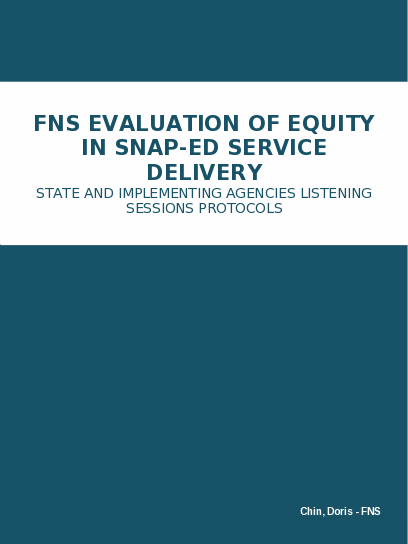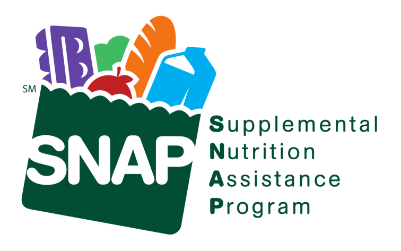The Evaluation of Equity in The Supplemental Nutrition Assistance Program Nutrition Education (SNAP-Ed) Service Delivery Project State and Implementing Agencies' Listening Sessions (Businesses)
FNS Fast Track Clearance for the Collection of Routine Customer Feedback
Appendix A. SNAP-Ed Equity Project Listening Sessions Protocols_final
The Evaluation of Equity in The Supplemental Nutrition Assistance Program Nutrition Education (SNAP-Ed) Service Delivery Project State and Implementing Agencies' Listening Sessions (Businesses)
OMB: 0584-0611
Appendix A. SNAP-Ed Equity Project Listening Sessions Protocol
OMB
Control Number: 0584-0611 Expiration
Date: 11/30/2025


Contents
1. Listening Sessions Priority Areas 2
1.1. End-to-End SNAP-Ed Service Delivery 2
1.2. SNAP-Ed Notification Processes in SNAP-Ed 2
1.3. SNAP-Ed Program Planning Processes 2
1.4. SNAP-Ed Service Delivery 3
2. Listening Sessions Protocol by Stakeholder Group 4
2.1.1. State Agencies General Talking Points: Introduction 4
2.1.2. State Agencies: Protocol for End-to-End SNAP-Ed Service Delivery 5
2.1.3. State Agencies: Protocol for SNAP-Ed Notification Processes 8
2.1.4. State Agencies: Protocol for SNAP-Ed Program Planning Processes 10
2.1.5. State Agencies: Protocol for SNAP-Ed Service Delivery 12
2.2.1 Implementing Agencies General Talking Points: Introduction 14
2.2.2 Implementing Agencies: Protocol for End-to-End SNAP-Ed Service Delivery 15
2.2.3 Implementing Agencies: Protocol for SNAP-Ed Notification Processes 18
2.2.4 Implementing Agencies: Protocol for SNAP-Ed Program Planning Processes 20
2.2.5 Implementing Agencies: Protocol for SNAP-Ed Service Delivery 22
This
information is being collected to assist the Food and Nutrition
Service (FNS) in obtaining feedback related to the evaluation of
equity in Supplemental Nutrition Assistance Program Nutrition
Education (SNAP-Ed) service delivery. This is a voluntary collection
and FNS will use the information for service improvement, training
and technical assistance development, and program management
purposes. The collection does request personally identifiable
information, but the information collected will not be included in
records that are subject to the Privacy Act of 1974. Responses will
be kept private to the extent provided by law. According to the
Paperwork Reduction Act of 1995, an agency may not conduct or
sponsor, and a person is not required to respond to, a collection of
information unless it displays a valid OMB control number. The valid
OMB control number for this information collection is 0584-0611. The
time required to complete this information collection is estimated
to average 90 minutes per listening session and no more than 2 hours
total, including the time for scheduling listening sessions,
introductions and instructions, and questions and answers. Send
comments regarding this burden estimate or any other aspect of this
collection of information, including suggestions for reducing this
burden to: U.S. Department of Agriculture, Food and Nutrition
Service, Office of Policy Support, 1320 Braddock Place, 5th
Floor, Alexandria, VA 22314. ATTN: PRA (0584-0611).

The USDA Food and Nutrition Service (FNS) will host listening sessions with State SNAP agencies (SA) and their implementing agencies (IA) to inform our understanding of current practices, and challenges and best practices in notification, program planning processes, and equitable SNAP-Ed service delivery.
These listening sessions will inform FNS’s understanding of end-to-end practices SAs and IAs use to develop and implement their SNAP-Ed service delivery. FNS will seek to understand the following:
Practices used to notify and promote nutrition education programs, including direct notification and/or marketing strategies they employ (e.g., direct mail, text, phone calls, emails, social media, flyers, apps etc.)
Information agencies use to inform program planning, including any needs assessments or data sources leveraged to understand the population health-related nutrition and physical activity needs of underserved communities and populations
Practices or strategies used to develop inclusive SNAP-Ed programming, and maximize program reach, including leveraging partnerships with agencies and organizations that serve the underserved population
Challenges, if any, with conducting outreach to, service planning for, and developing and delivering inclusive services to historically underserved populations
Guidance or technical assistance States and/or implementing agencies received and requested to inform their service delivery practices
These listening sessions will inform FNS’s understanding of practices SAs and IAs use to communicate with and notify eligible SNAP-Ed participants, specifically eligible individuals or populations from historically underserved populations or communities, including any promotion or marketing practices. FNS will seek to understand the following:
Agencies’ current notification practices
Actions agencies take in promoting nutrition education programs, including direct notification and/or marketing strategies they employ (e.g., direct mail, text, phone calls, emails, social media, flyers, etc.).
Extent to which practices incorporate strategies to engage underserved population demographics, including conducting outreach to populations who apply for SNAP benefits and those who currently receive SNAP or other nutrition assistance case management services
Challenges, if any, with conducting outreach to eligible people or populations, particularly across racial and ethnic groups, and indigenous communities, individuals with disabilities, and rural and urban geographic locations
Extent to which SNAP-Ed’s promotion practices foster inclusivity, related to culture, language, and abilities, among others
Guidance or technical assistance SAs and/or IAs requested and received to inform notification practices.
These listening sessions will inform FNS’s understanding of how State and implementing agencies identify the needs and gaps of historically underserved populations, and the extent to which their program planning practices are targeted to address identified gaps. FNS will seek to understand the following:
Information agencies use to inform program planning, including any needs assessments or data sources leveraged to understand the population health-related nutrition and physical activity needs of underserved communities and populations
Challenges, if any, in service planning, particularly for historically underserved populations
Extent to which States and implementing agencies anticipate or forecast future demand for services
How funding decisions are made, including the extent to which the inclusion of underserved populations and geographic locations are prioritized
Guidance SA and/or IAs requested and received to inform program planning
These listening sessions will inform the FNS’s understanding on State and implementing agencies’ experience in developing and delivering inclusive and accessible SNAP-Ed programs and services to underserved populations. FNS will seek to understand the following:
Practices or strategies used to maximize program reach, including leveraging partnerships with agencies and organizations that serve the underserved population
Practices or strategies used to develop inclusive SNAP-Ed programming
Challenges, if any, in delivering services to underserved populations
Guidance States and/or implementing agencies requested and received to inform service delivery
2.1 State Agencies
Hello! Thank you for taking time to speak with us today, we really appreciate it. I’ll provide a brief introduction to our project and walk you through the structure of the interview.
The USDA Food and Nutrition Service (FNS) has contracted with Accenture and Abt Associates to review States’ SNAP-Ed programs to identify challenges and best practices in equitable SNAP-Ed program access and service delivery, and to recommend strategies that support equitable SNAP-Ed service delivery to diverse racial and ethnic groups, individuals with disabilities, and underserved rural and urban geographic locations and indigenous communities.
The purpose of this call is to better understand current notification and promotion practices, any challenges you may experience when conducting outreach or promoting SNAP-Ed services, and guidance requested or received to effectively deliver SNAP-Ed programs and services to underserved populations or communities.
We’d also like to hear how FNS can better assist State agencies to ensure equitable service delivery of SNAP-Ed programs and services. One note, this call will only be attended by Accenture and Abt Associates.
For the purposes of this project, our team defines equity as fair and equal access to and allocation of State SNAP-Ed funding and service delivery across historically underserved populations, including diverse racial and ethnic groups; individuals living with disabilities; and urban and rural geographic locations, including indigenous communities.
This discussion will last approximately 90 minutes. During this time, we will cover three sections of questions [or will tailor to one of three sections based on the listening session focus area]:
Direct Outreach and Promotion Strategies for Eligible People or Populations
Challenges with Direct Outreach and SNAP-Ed Promotion
Guidance or Technical Assistance
Your participation in this listening session is voluntary. We will take notes during the conversation so that we can remember the information we collect. We will use this information in our report for FNS, describing the range of responses expressed by staff. The report will include the names of State Agencies that contributed information, but we will not quote you or anyone by name or title. Further, FNS is not running this project with an eye towards auditing or sanctioning States, so please feel comfortable to speak freely and without concern.
We’re hoping to cover a lot today, so we’ll aim to move through these questions efficiently. However, if you have any questions during today’s discussion, please don’t hesitate to let us know.
Do you have any questions before we begin?
Notification Practices |
|
|
|
|
|
|
|
|
|
|
|
|
|
|
|
|
|
|
|
Program Planning Process |
|
|
|
|
|
|
|
|
|
|
|
|
|
|
|
|
|
|
|
|
|
|
|
|
|
Service Delivery |
|
|
|
|
|
|
|
|
|
|
|
|
|
|
|
|
|
|
|
|
|
|
Conclusion |
|
|
|
|
|
|
|
Direct Outreach and Promotion Strategies for Eligible People or Populations |
|
|
|
|
|
|
|
|
|
|
|
|
|
|
|
|
|
|
|
|
|
|
Challenges with Direct Outreach and SNAP-Ed Promotion |
|
|
|
|
|
|
|
|
|
|
Guidance or Technical Assistance |
|
|
|
|
|
|
|
|
|
|
|
|
|
|
|
|
Conclusion |
|
|
|
|
Program Planning Process |
|
|
|
|
|
|
|
|
|
|
|
|
|
|
|
|
|
|
|
|
|
|
Budget Allocation |
|
|
|
|
|
|
|
|
|
|
|
|
|
Challenges in Program Planning |
|
|
|
|
|
|
|
|
|
|
|
|
|
Guidance or Technical Assistance |
|
|
|
|
|
|
|
|
|
|
|
|
|
|
|
|
Conclusion |
|
|
|
|
Inclusive Service Delivery |
|
|
|
|
|
|
|
|
|
|
|
|
|
|
|
|
Challenges in SNAP-Ed Service Delivery |
|
|
|
|
|
|
|
|
|
|
|
|
|
|
|
|
Guidance |
|
|
|
|
|
|
|
|
|
|
|
|
|
|
|
|
|
|
|
Conclusion |
|
|
|
|
Closing Remarks
Thank you for participating in today’s discussion! Your responses will be an asset to our evaluation and final report product.
If you have any questions following this interview, please contact Doris Chin, Contracting Officer Representative at SNAP Nutrition Education Branch or Ada Nwadugbo, the Project Manager for this study.
2.2.1 Implementing Agencies General Talking Points: Introduction
Hello! Thank you for taking time to speak with us today, we really appreciate it. I’ll provide a brief introduction to our project and walk you through the structure of the interview.
The USDA Food and Nutrition Service (FNS) has contracted with Accenture and Abt Associates to review States’ SNAP-Ed programs to identify challenges and best practices in equitable SNAP-Ed program access and service delivery, and to recommend strategies that support equitable SNAP-Ed service delivery to diverse racial and ethnic groups, individuals with disabilities, and underserved rural and urban geographic locations and indigenous communities.
The purpose of this call is to better understand current notification and promotion practices, any challenges experienced when outreaching or promoting SNAP-Ed services and guidance requested or received to effectively deliver SNAP-Ed programs and services to underserved populations or communities.
We’d also like to hear how FNS can better assist State agencies to ensure equitable service delivery of SNAP-Ed programs and services. One note, this call will only be attended by Accenture and Abt Associates.
For the purposes of this project, our team defines equity as fair and equal access to and allocation of State SNAP-Ed funding and service delivery across historically underserved populations, including diverse racial and ethnic groups; individuals living with disabilities; and urban and rural geographic locations, including indigenous communities.
This discussion will last approximately 60-90 minutes. During this time, we will cover three sections of questions [or will tailor based on the listening session focus area to one of three sections]:
Direct Outreach and Promotion Strategies for Eligible People or Populations
Challenges with Direct Outreach and SNAP-Ed Promotion
Guidance or Technical Assistance
Your participation in this listening session is voluntary. We will take notes during the conversation so that we can remember the information we collect. We will use this information in our report for FNS, describing the range of responses expressed by staff. The report will include the names of implementing agencies that contributed information, but we will not quote you or anyone by name or title. However, FNS is not running this project with an eye towards auditing or sanctioning States or Implementing Agencies, so please feel comfortable to speak freely and without concern.
We’re hoping to cover a lot today, so we’ll aim to move through these questions efficiently. However, if you have any questions during today’s discussion, please don’t hesitate to let us know.
Do you have any questions before we begin?
2.2.2 Implementing Agencies: Protocol for End-to-End SNAP-Ed Service Delivery
Direct Outreach and Promotion Strategies for Eligible People or Populations |
|
|
|
|
|
|
|
|
|
|
|
|
|
|
|
|
|
|
|
|
|
|
Challenges with Direct Outreach and SNAP-Ed Promotion |
|
|
|
|
|
|
|
|
|
|
|
|
|
Guidance |
|
|
|
|
|
|
|
|
|
|
|
|
|
Conclusion |
|
|
|
|
Closing Remarks
Thank you for participating in today’s discussion! Your responses will be an asset to our evaluation and final report product.
If you have any questions following this interview, please contact Doris Chin, Contracting Officer Representative at SNAP Nutrition Education Branch or Ada Nwadugbo, the Project Manager for this study.
OMB Control Number: 0584-0611
Expiration Date: XXXXXX
| File Type | application/vnd.openxmlformats-officedocument.wordprocessingml.document |
| File Title | Project Management Plan |
| Author | Chin, Doris - FNS |
| File Modified | 0000-00-00 |
| File Created | 2024-10-26 |
© 2026 OMB.report | Privacy Policy